Introduction
In the pursuit of a healthier and more sustainable lifestyle, many individuals are turning to organic alternatives, not only in their diet but also in their approach to gardening and pest control. The use of chemical pesticides may offer quick solutions, but they often come with environmental and health risks. This post aims to shed light on effective organic pest control methods that not only protect your plants but also contribute to a safer and more ecologically balanced environment.
1. Companion Planting
One of the oldest and most natural methods of pest control is companion planting. By strategically placing certain plants together, you can create a mutually beneficial environment that deters pests. For example, planting marigolds among vegetables can help repel nematodes, while basil can protect tomatoes from various insects.
2. Neem Oil
Neem oil, derived from the neem tree, is a powerful organic pesticide. It disrupts the life cycle of pests, acting as a natural insect repellent. Neem oil is effective against a wide range of pests, including aphids, mites, and caterpillars, while being safe for plants and beneficial insects.
3. Diatomaceous Earth
Diatomaceous earth is a fine powder made from the fossilized remains of tiny aquatic organisms called diatoms. It works by absorbing the lipids from the exoskeleton of insects, causing them to dehydrate and die. Diatomaceous earth is effective against various pests, including ants, fleas, and beetles, without posing any harm to humans, pets, or plants.
4. Beneficial Insects
Introducing beneficial insects into your garden is a natural and sustainable way to control pests. Ladybugs, predatory beetles, and lacewings are examples of insects that feed on harmful pests. By creating an environment that supports these beneficial insects, you can establish a natural balance that keeps pest populations in check.
5. Garlic Spray
A homemade garlic spray is an excellent deterrent for many pests. Garlic contains natural compounds that repel insects and disrupt their feeding habits. To create a garlic spray, simply mix crushed garlic with water and a small amount of soap. This mixture can be sprayed on plants to keep pests at bay.
Conclusion
Embracing organic pest control methods not only protects your garden but also contributes to a sustainable and eco-friendly gardening practice. By avoiding harmful chemicals, you ensure the well-being of your plants, the environment, and yourself. As more individuals adopt these methods, we move towards a future where gardening is not just a hobby but a positive contribution to the planet. Explore these organic pest control methods and witness the flourishing of your garden in harmony with nature.



